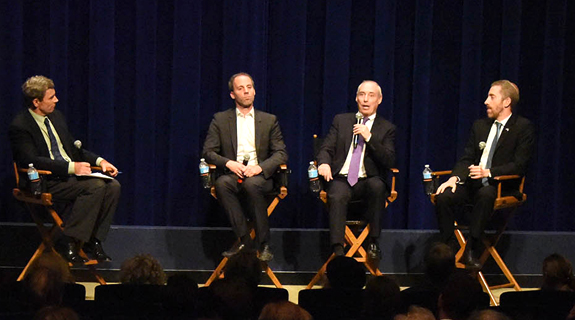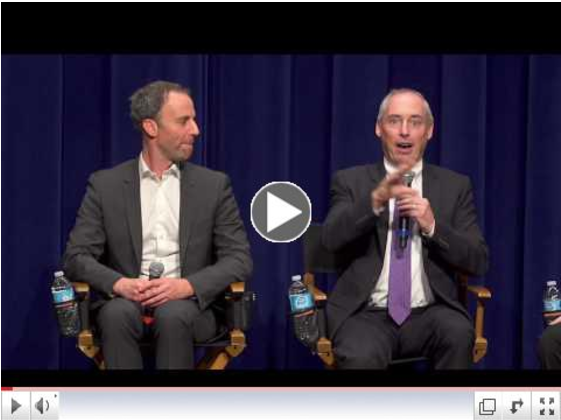
From left to right: Terry McCarthy, Josh Lockman, Dan Schnur, and Joel Pollak
President Trump’s unpredictability in his foreign policy is either a masterful way of keeping foreign opponents off balance, or a lamentable lack of leadership that is destabilizing Asia and the Middle East. The inquiry into Russian hacking of the elections is either a red herring or could lead to the downfall of his presidency. In the first 100 days of his administration he has successfully reversed a draft of Obama-era regulations, or he has embarrassingly failed to have any major legislation passed despite ambitious campaign pledges. Much as the country is divided on the merits of the Trump administration, so too did a LAWAC panel discussion on May 2nd in the Writers’ Guild Theater produce very diverging views on our 45th president.
Defending Trump’s record was Joel Pollak, senior editor-at-large at Breitbart News, who said that the US needs to be more unpredictable: “Under previous administrations we have predictably withdrawn from conflict… he gains a strategic advantage in keeping his opponents guessing.”
Opposing much of Trump’s performance was Josh Lockman, a former foreign policy advisor to Hillary Clinton, who said Trump makes his decisions “based on the last thing he saw on cable television”, has no awareness of policy, and risks not being taken seriously either by U.S. allies or opponents.
Charting a middle course in the discussion was Dan Schnur, a professor at USC Annenberg’s School of Communications who oversaw the USC Dornsife/LA Times Daybreak poll which was one of the few election polls to correctly show Trump beating Hillary Clinton. “Trump believes words don’t matter,” said Schnur. “Throughout his business career he has believed he wins from unpredictability - this is not bluster, it is intentional.” But Schnur points out that in international diplomacy - with the danger of a real war breaking out - the stakes are considerably higher than in negotiating real estate deals. “It is not to say he can’t or won’t learn a lesson.”
Pollak defended Trump’s recent invitation to President Duterte of the Philippines to visit the White House, despite criticism of his human rights record and the extrajudicial killings of drug dealers at home: “Duterte is Trump on steroids - we have to deal with him. He is currently flirting with China, but we need him to be pro-American.” Lockman said that Trump “fetishizes dictators”, shows no concern for human rights, and has distanced himself - and by extension US foreign policy - from international norms.
Attacking Trump’s policies on immigration, Lockman said Trump “swings between two poles - paleo-nationalism and hawkishness”, and said the early attempt by the administration to ban travelers from seven Muslim countries “is almost certainly unconstitutional.” Pollak said it might have been bad policy, but was not unconstitutional: “The president can decide who comes into the country.” He claimed the US “has always used religion in immigration laws,” and pointed to the ban on polygamous immigrants, which means Muslims and others who have multiple wives are not allowed to bring them all into the US.
When asked about Steve Bannon, Pollak - who had worked closely with Bannon at Breitbart - said “he is a tough, driven guy who has an amazing strategic view that can look past the current crisis.” He said Bannon doesn’t particularly care about the media criticism - “he called himself Darth Vader in an interview” - and said Bannon would be sticking around for some time in the White House.
Schnur said that Bannon “is Trump’s muse” and has helped to establish Trump’s position in politics. “Trump has a chip on his shoulder about Manhattan elites,” and Bannon has helped him see how to motivate his base in the rest of the country. But Schnur predicted that as Trump gains confidence in himself “he will no longer need Bannon to keep his rapport with voters.”
Lockman said that the ongoing investigation into Russian meddling in the election was not going to go away. “I think it will cripple Trump’s presidency, and it could be fatal.” He recalled that the Watergate scandal took two years to unfold, and said “there is fire to this smoke”. Pollak said the Russia investigation was a red herring - “the Democrats just want to blame Russia because they lost the election.”
One of the few areas of agreement from all the panelists was about how badly the media performed in reporting the campaign: “I am surprised at how uncurious journalists have become,” said Pollak. “Journalists are too interested in what they say about each other and not what the American people have to say.”
Schnur said that smart phones and social media have produced a “me generation” that has become used to only listening to news sources they agree with, leading to a lack of real discussion amongst people with diverging views. Which is what made the LAWAC panel discussion “such a nice thing to see,” said Pollak at the end of the evening.

 Dan Schnur on the political divide over President Trump
Dan Schnur on the political divide over President Trump